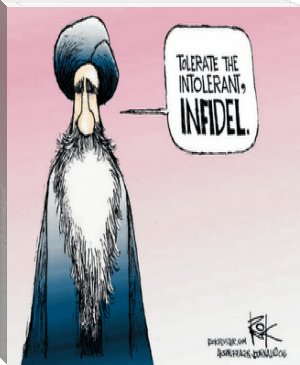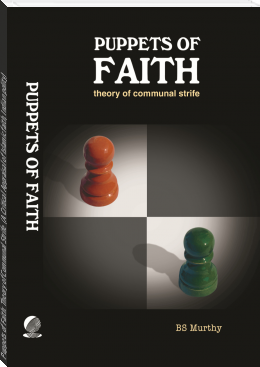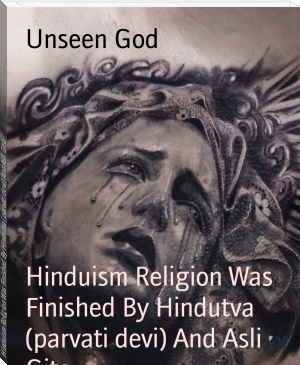Have Hindus Become More Intolerant, Or less Indulgent? by BS Murthy (best reads txt) 📕

- Author: BS Murthy
Book online «Have Hindus Become More Intolerant, Or less Indulgent? by BS Murthy (best reads txt) 📕». Author BS Murthy
When the Semitic free run on the Hindu turf under Sonia’s proxy watch ended with the ascent of Narendra Modi onto the Delhi gaddi, the Indian agendas of the Christian west and the Muslim umma faced impediments resulting in the brouhaha over the growing religious intolerance of Hindus towards India’s minorities. Given the racial biases and the religious prejudices of both against the Hindus and that the world media, by and large is controlled by them, a critical appraisal of their propaganda with objective lenses is called for.
Hence, as the accusation is on the religious ground, it is imperative that the theocratic credos of Islam and Christianity as well as the philosophical ethos of santana dharma aka Hinduism, the only surviving ‘way of life’ of yore on earth, are to be reckoned with.
The pristine precepts of Hinduism are -
Narō Nārayana
Man is but God,
Vasudhaiva kutumbakam
Holds world all in one household, and
ekam sadviprā bahudhā vadanti.
What is right is One only, describe it wise variedly.
However, in time, as the broad ‘man is but God’ became the narrow ‘caste is the creed’, the so-called Hindu upper castes, so as not to suffer all and sundry, turned head on the unifying ‘holds world all in One household’ into the divisive ‘sunder castes men on earth’. What is worse, they managed to push the so-called lower castes into untouchable dalit ghettos on the peripheries, and far away from temples of their gods.
It was into such an Indian setting that the Muslim vandals, spurred by the Quranic credo of loot and rapine, made their way to render it unto Islam. However, setting aside the Muslim penchant to force the conquered populace into their alien faith, for the most part, the craving of the deprived-of-god dalits for a religious hold that could have furthered their Islamic cause to convert. Nevertheless, the self-absorbed upper caste Hindus were indifferent to the socially inimical development that began to upset the demographics of their ancient land even as the progeny of the converted began to imbibe the ethos of Islam that underscores their inseparable separateness from the non-believers that is besides inculcating hatred towards them with Quranic diktats such as –
“Your friend can be only Allah: and His messenger and those who believe, who establish worship and pay the poor due, and bow down (in prayer).”
“O ye who believe! Take not the Jews and Christians for friends. They are friends one to another. He among you who taketh them for friends is (one) of them. Lo! Allah guideth not wrongdoing folk.”
“Let not the believers take disbelievers for their friends in preference to believers. Whoso doeth that hath no connection with Allah unless (it be) that ye but guard yourselves against them, taking (as it were) security. Allah biddeth you beware (only) of Himself. Unto Allah is the journeying.”
“Those who believe do battle for the cause of Allah; and those who disbelieve do battle for the cause of idols. So fight the minions of the devil. Lo! the devil’s strategy is very weak.”
“Relent not in pursuit of enemy, If ye are suffering, lo! They suffer even as ye suffer and ye hope from Allah that for which they cannot hope. Allah is ever Knower, Wise.”
“It is not for any Prophet to have captives until he hath made slaughter in the land. Ye desire the lure of this world and Allah desireth (for you) the Hereafter, and Allah is Mighty Wise.”
However, the haughty upper caste Hindus, who according to Alberuni thought ‘there is no country but theirs, no nation like theirs, no kings like theirs, no religion like theirs, no science like theirs”, never deemed fit to grasp the nitty-gritty of the alien faith and instead could have falsely assumed that it would be but a benign variant of their own dharma, ‘what is right is One only, describe it wise variedly’, and thus saw no need to contain its growth in their midst for which their progeny paid the Islamic price in the form of Pakistan a millennium later.
In that setting, while the upper caste Hindus, who dismissed the Islamic invaders as mlechchas, also derided the converts as katuas, owing to their circumcision that their new faith ordained, the new-found religious aggressiveness of the latter coupled with their age-old social grievance could have ensconced them in an impotent rage. However, the fact that the intruders happened to lord over their erstwhile oppressors would have afforded some vicarious pleasure to the Indian Musalmans. Yet, in a remarkable social intercourse, the newly minted Muslims that gloated over the reflected glory of the new rulers and the upper caste Hindus, who laid store on their perceived superiority over all others, managed to live together tenuously though, which, in later days, the left-liberals came to romantically falsify as ganga jamuna tahjeeb.
Then, when the eight-hundred years old Islamic semi-dominance over India was on the wane, the Christianity spread its religious wings under the aegis of the British Raj, ostensibly to reform the Hindu heathens that the Bible holds in utter contempt in psalms such as -
“Ask of me, and I shall give thee the heathen for thine inheritance, and the uttermost parts of the earth for thy possession.” 2:8
“Thou shalt break them with a rod of iron; thou shalt dash them in pieces like a potter's vessel.” 2:9
“Thou hast rebuked the heathen, thou hast destroyed the wicked, thou hast put out their name for ever and ever.” 9:5
“Thou hast given us like sheep [appointed] for meat; and hast scattered us among the heathen.” 44:11
“But thou, O LORD, shalt laugh at them; thou shalt have all the heathen in derision.” 59:8
“Pour out thy wrath upon the heathen that have not known thee, and upon the kingdoms that have not called upon thy name.” 79:6
So, starting from the dalit bastis, the evangelists forayed further into the tribal tandas to spread Christianity by means fair and foul. However, as their catchment areas were peripheral to the Brahmin agraharas and the upper caste quarters, the Christian demographic alarm failed to wake them up from their slumber of indifference though unyoked from the Islamic hegemony by then. And to make matters were for them, Macaulay came up with his Minute on Indian Education, which, among other things was aimed to divest the Hindus from their “false history, false astronomy, false medicine, in company with their false religion” with the right western education.
However, while the Musalmans, fearing that the western education would lead to the dilution of Islamic faith among their wards, avoided Macaulay like a plague, the Hindus embraced him willy-nilly giving up their ‘haughty’ indifference to other faiths end ending up with ‘naive’ indulgence towards them. What is worse, from the Hindu point of view, the Macaulay education, over time, succeeded in making them have a dim view of the sanatana dharma of their progenitors and skeptical about all things Hindu be it its history, astronomy, medicine, culture etc. If anything, Gandhi in later years, to put it in the Hindi phase, turned out to be Macaulay’s baap, for he professed that “Hindus should not harbour anger in their hearts against Muslims even if the latter wanted to destroy them. Even if the Muslims want to kill us all we should face death bravely. If they established their rule after killing Hindus we would be ushering in a new world by sacrificing our lives.” But it was Nehru, who symbolized the fruition of the Macaulay mission for he not only proclaimed that “I’m English by education, a Muslim by culture, just born a Hindu by accident” but also conducted himself accordingly.
It’s thus, when it came to choosing the first Prime Minister of what is left of India after Jinnah had parted with parts of its land to establish Pakistan for the Musalmans, it’s no mere coincidence that Gandhi threw his heavy weight behind the Muslim-oriented Nehru and against the Hindu-minded Patel. Immediately thereafter, true to his character, Nehru strained every nerve to ensure that the Indian Musalmans did not migrate in numbers to Pakistan though the raison d'être of India’s partition was their assertion that they cannot co-exist with the Hindus. What is worse, he was allergic to the persecuted Hindu refugees from the then East Pakistan and even wanted them to be pushed back into it never mind their annihilation by the Bengali Musalmans therein, so to say, to put Gandhi’s preaching into practice. In the light of the above, and his reported obeisance, besides that of his daughter Indira and his great-grandson Rahul, to the Islamic invader Babur’s grave in Afghanistan, should be seen the conjecture that his own grandfather was a Musalman with Nehru nom de guerre.
Hence, it could not have been a mere coincidence that Nehru placed Hindu India’s educational reins in the hands of Maulana Abul Kalam Azad, who publicly voiced his fears that post-partition, the Muslim minority in the Hindu majority India would be disadvantaged. So, so to say, during his decade-long helm at India’s ‘secular’ education, the clever Maulana succeeded in making it seem to the vulnerable Hindu minds that the Muslim rule over their ancient land was but a natural Islamic course all the while downplaying their ancestral resistance to the same. Neither is the fact that four more Musalmans, all appointed by either by Nehru or Indira, reigned supreme in the corridors of Indian education for about nine more years, all of which was during the first thirty years after India’s independence, could be more than mere coincidence. It’s no wonder the Hindus who adorned that office in between these worthies or those that came later dared not alter the Nehruvian educational course set by the Islamic credo that insensibly became the non-violable creed of the Indian school curriculum till date.
It was in this continuing Hindu tragic play, Indira leased the academic stage to the Hindu-allergic and Islamapologic leftists in lieu of their political props, to let them shape and sustain the Hindu-inimical narrative for over five decades. Thus with the State’s patronage, the dubious leftists by adding the deceitful liberal suffix, managed to spread their anti-Hindu tentacles into every sphere of intellectual activity with impunity, thereby unerringly shaping an inalienable idea of India in which the Islamo-Christian communalism is deemed as secular and Hindu cultural assertion is regarded as communal. This obnoxious narrative on one hand gave fillip to Muslim separateness, displayed by skullcaps, even on kids’ heads, and on the other, fuelled the Christian urge to harvest the dalit and the tribal souls for the cause of Jesus, and any Hindu concern on either count came to be derided as religious intolerance. It was as if the Hindu feelings didn’t count in their own country, even after its partition on religious grounds, and when their pent-up anger erupted in Ramajanma Bhoomi movement resulting in the hot-headed demolition of the Babri Masjid, built over Ayodhya’s Ram Mandir in Babur’s time, the left-liberal ecosystem ensured that the entire Hindu community was engulfed in secular shame.
However, ten years later, when a Muslim mob at Godhra torched alive fifty-two Hindu pilgrims returning from Ayodhya to their native places in that Sabarmati Express resulting in the retaliatory rioting in Gujarat, even as the Mullahs tuned in “Islam is a religion of peace”, the Muslim intelligentsia proclaimed the growing Hindu communalism as the bane of secular India, of course to the nodding Islam naïve Hindu heads. It was this Hindu intellectual apathy that failed to produce even a single book on Islam in thousand years of its Indian presence (save Ambedkar’s stray, though incisive, thoughts on Islam and not counting Chamupati Lal’s thirty-four page Hindi booklet, Rangeela Rasool, published anonymously though, some hundred years before then that is available





Comments (0)